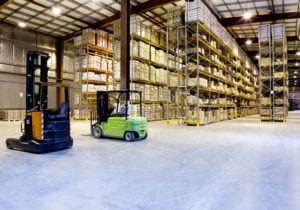What is Warehouse Logistics? Challenges, Benefits, and Best Practices


In the complex landscape of supply chain management, warehouse logistics emerges as a pivotal component, central to enhancing operational efficiency and customer satisfaction.
This article delves into the intricacies of warehouse logistics, shedding light on its fundamental role in streamlining storage and distribution. By embracing innovative technologies and methodologies, businesses can navigate the challenges of warehouse logistics, reaping benefits that extend across their supply chain.

To define warehouse logistics, we must first understand the meaning of logistics itself. In the simplest possible terms, logistics may be defined as the detailed planning, organization, management, and implementation of complex operations. In many industries, including warehousing, logistics also extends to the flow of both physical goods and information.
Warehouse logistics, therefore, encompasses all the varied, complex factors – organization, movements, and management – involved in warehousing. This includes the flow (shipping and receiving) of physical inventory, as well as that of more abstract goods, including information and time.
Warehouse logistics may also extend to anything from warehouse pest control, to damaged goods handling, to safety policies, to human resources management, to customer returns. In other words, warehouse logistics involves all the policies, procedures, and organizational tools necessary to keep your warehouse operations running smoothly.
Common warehouse logistics challenges revolve around organization: Simply put, how can you achieve detailed control over something as large as a warehouse?
And yet, you must. You must be able to pinpoint the exact location of a specific item of inventory, the pallet that carried a purportedly expired food item, or the truck that shipped an item damaged during shipment. These controls are paramount to smooth operations and healthy revenues, and yet, without expert tools, they are nearly impossible to achieve.
Warehouse challenges run even deeper than these immediate concerns, extending into inventory management, supply chain management, cost controls, human resources, risk management, and security, among other factors.
So, how can you achieve enough flexibility to stay competitive, while maintaining adequate offerings to please customers, while still exercising sufficient controls to protect your revenues? These are the questions facing warehouses today.
It’s indisputable: warehouse managers have a lot on their plates. Luckily, you also have increasingly helpful, incredibly powerful tools to help you meet the needs of your warehouse, the requirements of your employees, and the expectations of your customers.
Advanced warehouse management systems (WMS) give you real-time insight into your warehouse, and equip you – and all your employees – with the necessary tools to effectively, efficiently and profitably manage your warehouse.
Indeed, a WMS is not only a sure way to improve warehouse operations management and warehouse logistics but is also a must in today’s warehousing. More than an inventory control system, warehouse management systems take control of all warehouse logistics, from inventory control and management, to order fulfillment. Many WMS today incorporate mobile tools, so your warehouse managers and employees can consult the system on the go, via smartphone.
Comprehensive WMS also combine traditional management tools with warehouse control systems (WCS) to create a whole-warehouse synergy to improve your overall logistics, from inventory receipt to shipping.
The benefit of controlled warehouse logistics is simple – increased revenue.
Think of it this way: When your warehouse operations run smoothly, inventory is properly accounted for, the right item is sent at the right time, stock is replenished when needed, fewer picking errors occur, and all the people, processes, and systems fall into place as they should, your warehouse operates more efficiently. There are fewer errors and fewer problems, and that means maximized revenue.
When you implement a solid WMS to control your warehouse logistics, you:
Other WMS benefits extend to better demand planning, improved visibility and transparency, stock traceability, fewer picking errors, optimized processes, efficient labor allocation, and improved customer services – factors that boil down to reduced operational expenses and more revenue.
Without a doubt, a capable WMS can transform your operations and optimize logistics. But a software tool, no matter how powerful, can only go so far as human error. In real-life settings, warehouse considerations heavily influence your logistics.
Your warehouse managers and, to a certain extent, all involved employees must be well trained in using your equipment and WMS. Your transportation, 3PL, and related contractors and suppliers must coordinate with your logistics efforts. Any changes to your warehousing – new racking, updated organization, etc. – must be accounted for in the system, or problems will quickly manifest.
Warehouse logistics are not static. They change with your physical needs, your inventory, your employees, and any other factors that they govern. In the end, while you can implement tools and procedures to help govern and control warehouse logistics, smooth operations hinge on watchfulness, proper training, and evolving policies.
Our sales engineers are experts in automatic asset tracking, tagging and identification,a nd can answer all your questions. Get in touch now.
Lets Talk ›Enter your information and get a free checklist of the top questions to answer and tips to plan a successful asset tagging project for any warehouse management system implementation.